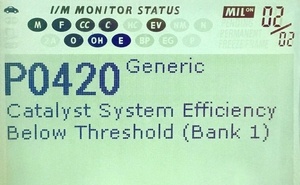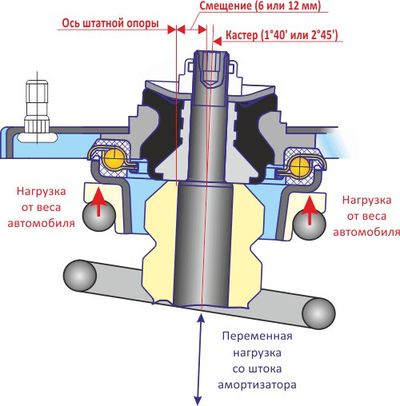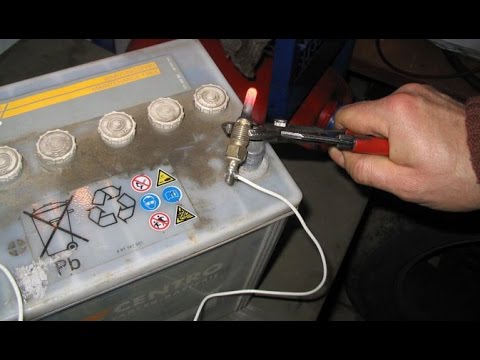
P0420 Catalytic converter - efficiency below acceptable level (bank 1)
Content
P0420 – OBD-II Trouble Code Technical Description
Trouble code P0420 indicates that the catalytic converter (bank 1) efficiency is below acceptable levels.
What does the fault code mean P0420?
Trouble code P0420 indicates that the catalytic converter (bank 1) is insufficient. This means that the catalytic converter, which is designed to clean up harmful emissions from engine exhaust, is not doing its job properly. The catalytic converter is designed to purify harmful emissions that are formed during the combustion of fuel in an internal combustion engine. It uses special metal meshes to chemically convert harmful substances into safe components.

Possible reasons
Some possible reasons why trouble code P0420 may appear:
- Faulty catalytic converter: If the catalytic converter becomes worn, damaged, or clogged, it may no longer function properly and may not provide the proper level of exhaust purification.
- Exhaust system leak: Exhaust system leakage problems, such as cracks or holes in the exhaust manifold or pipes, can allow additional air to enter the system, which in turn can lead to erroneous readings from the oxygen sensors and a P0420 code.
- Faulty oxygen sensors: If one of the oxygen sensors is faulty or is producing incorrect data, it can cause a P0420 code to appear. The malfunction may be related to either the sensor installed in front of the catalytic converter or the one installed after it.
- Problems with the fuel injection system: Insufficient or excessive mixing of air and fuel due to problems with the fuel injection system can lead to poor performance of the catalytic converter and therefore a P0420 code.
- Electronics problems: Errors or malfunctions in the engine management system (ECM) or other vehicle electronic components can also cause this trouble code to appear.
These are just a few of the possible causes of the P0420 trouble code. For an accurate diagnosis and solution to the problem, it is recommended to carry out a comprehensive diagnosis of the car at a specialized car service center.
What are the symptoms of a fault code? P0420?
The symptoms that accompany the P0420 trouble code can vary depending on the specific cause of this error code, as well as the condition of the vehicle, some of the possible symptoms are:
- Check Engine Indicator: The appearance and illumination of the Check Engine light on your vehicle's dashboard is the most common symptom of a P0420 code. This may be the first sign of a problem with the catalytic converter.
- Performance degradation: In some cases, engine performance may deteriorate, power may be lost, or the engine will run erratically.
- Increased fuel consumption: Inefficient operation of the catalytic converter can lead to increased fuel consumption due to incomplete combustion of fuel or incorrect exhaust gas cleaning.
- Exhaust smell: An unusual exhaust odor may occur due to insufficient exhaust gas purification by the catalytic converter.
- Vibrations or noises: If there are serious problems with the catalytic converter, vibrations or unusual noises may occur from the exhaust system.
These symptoms can occur in varying degrees and may be caused by problems other than problems with the catalytic converter. If these symptoms occur, it is recommended that you contact a qualified auto mechanic for diagnosis and repair.
How to diagnose a fault code P0420?
To diagnose DTC P0420, the following steps are recommended:
- Checking the error code: You will first need to use an OBD-II scanner to read the error code and ensure that it is indeed a P0420 code.
- Visual inspection: Inspect the exhaust system for visible damage, leaks, or other problems such as cracks or holes in the pipes or catalytic converter.
- Checking oxygen sensors: Check the oxygen sensor readings (before and after the catalytic converter) using a data scanner. Make sure they work correctly and do not show incorrect values.
- Catalytic Converter Test: There are specific tests that can be performed to evaluate the performance of the catalytic converter. This may include analyzing the exhaust gas composition and testing the catalytic converter for clogging or damage.
- Checking fuel injection: Check the fuel injection system for problems such as fuel leaks, faulty injectors, or problems with the fuel pressure regulator.
- Ignition system diagnostics: Problems with the ignition system, such as faulty spark plugs or wires, can also cause the P0420 code.
- Checking the engine management system: Check the operation of other engine management system components, such as air pressure and temperature sensors, and the ignition system.
- Fuel quality check: Sometimes poor fuel quality or the use of incompatible fuel additives can cause problems with the catalytic converter.
After completing these steps and identifying possible problem areas, it is recommended to repair or replace the parts that are causing this error.
Diagnostic errors
When diagnosing DTC P0420, the following errors may occur:
- Incorrect interpretation of data: One of the main mistakes is the incorrect interpretation of data obtained during diagnosis. For example, incorrectly reading oxygen sensor values or incorrectly assessing the efficiency of the catalytic converter.
- Skipping important steps: Some auto mechanics may skip important diagnostic steps, such as a visual inspection or checking the fuel injection system, which may result in the problem being missed.
- Insufficient expertise: Insufficient knowledge and experience in the field of vehicle diagnostics and repair can lead to incorrect determination of the cause of the P0420 error code and, as a result, to incorrect repairs.
- Use of low-quality equipment: Using low-quality or outdated diagnostic tools and equipment can also lead to errors.
- Insufficient diagnosis: Sometimes auto mechanics may decide to replace the catalytic converter without performing a full and comprehensive diagnosis, which can result in unnecessary expense and failure.
- Ignoring other potential causes: By focusing solely on the catalytic converter, other potential causes, such as problems with the fuel injection system or ignition system, may be missed.
To avoid these mistakes, it is important to take a methodical approach to diagnosis and conduct a comprehensive check of all possible causes.
How serious is the fault code? P0420?
Trouble code P0420 indicating catalytic converter inefficiency (bank 1) can be considered serious as it may indicate that the catalytic converter is not performing its function properly. It is important to understand that the catalytic converter plays an important role in reducing harmful emissions into the atmosphere, ensuring that the vehicle meets environmental standards and preventing environmental pollution.
Although a vehicle with a P0420 code may still run, it may result in increased emissions, high fuel consumption, and loss of performance. Moreover, if the cause of the problem is not corrected, it can lead to further damage to the exhaust system and other serious engine problems.
Therefore, it is necessary to take the P0420 code seriously and promptly begin diagnosing it and eliminating the cause. The sooner the problem is resolved, the less negative consequences there will be for the car and the environment.
What repair will help eliminate the code? P0420?
Resolving the P0420 trouble code may require different types of repairs depending on the specific cause of the problem, some of the possible repair actions are:
- Replacing the catalytic converter: If the catalytic converter is truly damaged or ineffective, it may need to be replaced. This is one of the most common repairs for code P0420. You must ensure that the new catalytic converter meets vehicle specifications and is installed correctly.
- Repair or replacement of oxygen sensors: Poor performance of oxygen sensors can cause the P0420 code to appear. Check and replace oxygen sensors if necessary. Make sure they are installed and connected correctly.
- Exhaust system repair: Check and, if necessary, repair other exhaust system components such as the muffler, exhaust manifold, and pipes to ensure there are no leaks or other problems that could affect the performance of the catalytic converter.
- Cleaning the fuel system: Problems with the fuel injection system or the use of low-quality fuel can cause the P0420 code. Clean the fuel system or replace the fuel filter.
- Checking and cleaning air pressure and temperature sensors: Problems with the air pressure or temperature sensors can also cause the P0420 code. Check and clean or replace faulty sensors.
When a P0420 error code occurs, it is recommended that you conduct a comprehensive diagnostic test to determine the specific cause of the problem, and then perform the appropriate repairs or component replacement. If you do not have the experience or the necessary equipment, it is better to contact a professional auto mechanic to carry out repairs.
P0420 – Brand-specific information
Trouble code P0420 can occur on various makes of vehicles and indicates problems with the efficiency of the catalytic converter (bank 1), a few examples:
- Toyota / Lexus: On Toyota and Lexus vehicles, the P0420 code may indicate an ineffective catalytic converter.
- Honda/Acura: On Honda and Acura vehicles, the P0420 code also indicates problems with the catalytic converter.
- Ford: On some Ford vehicles, the P0420 code may occur due to problems with the catalytic converter or oxygen sensors.
- Chevrolet / GMC: On Chevrolet and GMC vehicles, the P0420 code may indicate problems with the catalytic converter.
- Volkswagen / Audi: On Volkswagen and Audi vehicles, the P0420 code may appear due to problems with the catalytic converter or related exhaust system components.
These are just a few examples, and the P0420 code can occur on a variety of makes and models of vehicles. It is important to remember that diagnostics and repairs must be performed by a qualified technician based on your specific vehicle make and model.

